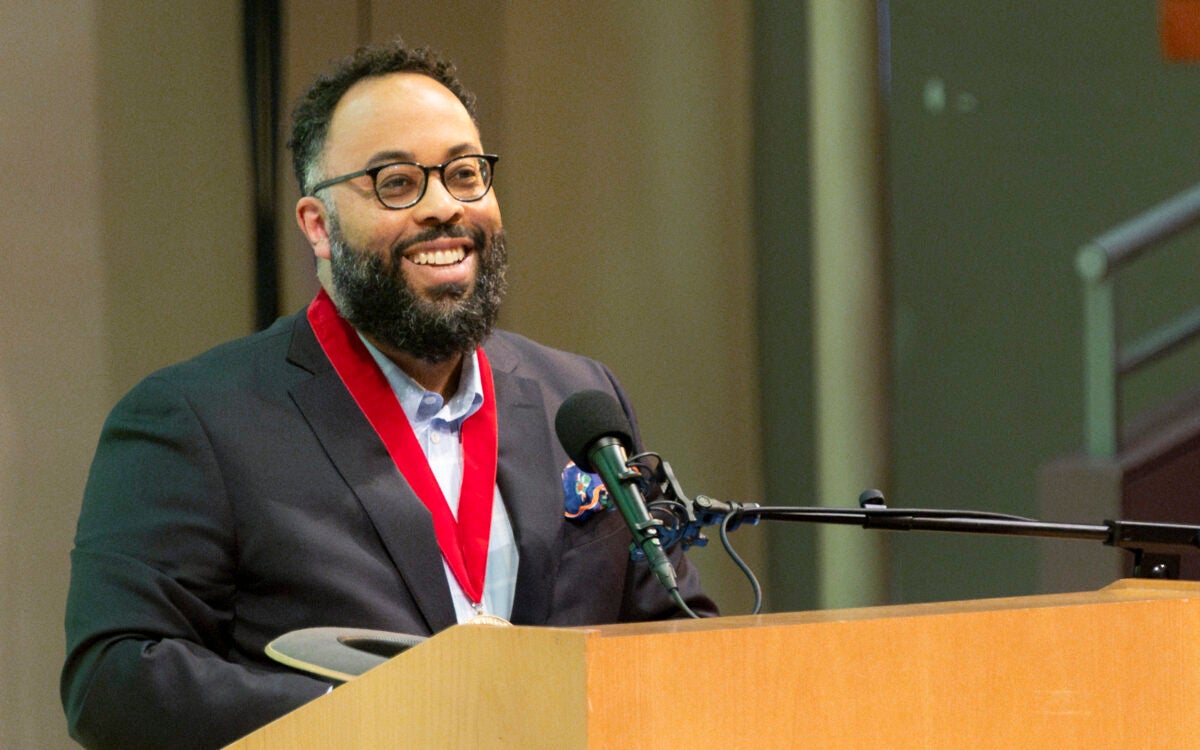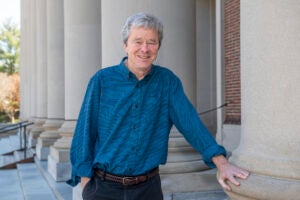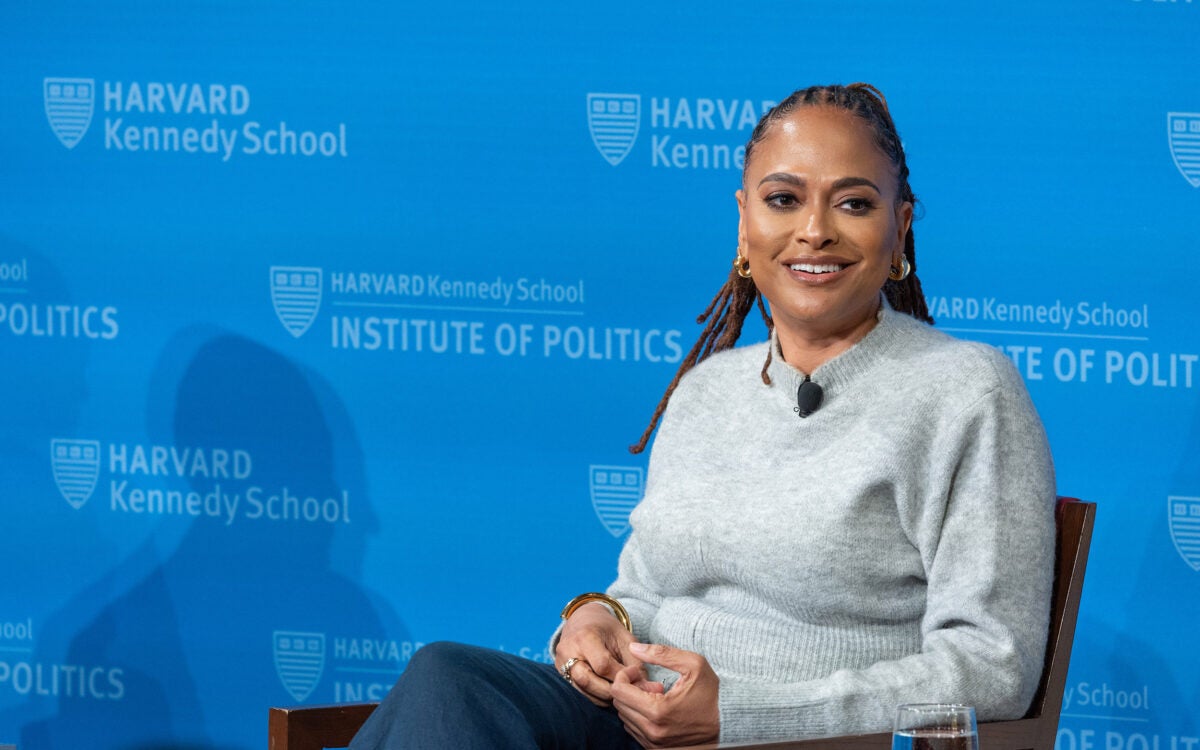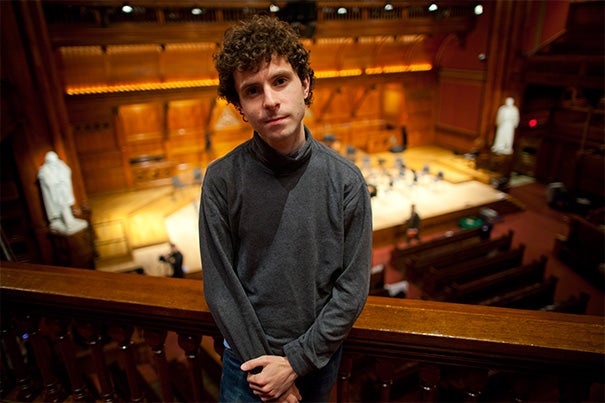
In May, Harvard alum Matt Aucoin’s opera “Crossing” will premiere with the American Repertory Theater as part of the theater’s involvement with the Harvard Civil War Project. Aucoin ’12 said he started working on the first draft in December 2012.
File photo by Stephanie Mitchell/Harvard Staff Photographer
The wrong way forward
Composer-librettist Aucoin reflects on Whitmanesque journey behind ‘Crossing’
Conductor and composer Matt Aucoin ’12 is often compared to another Harvard alumnus with an extraordinary gift for music: Leonard Bernstein. Anyone familiar with Aucoin’s work and talent knows it’s an apt comparison. After graduation, Aucoin took his degree in English and years of experience with Harvard’s music scene to New York to work with the Metropolitan Opera. He now divides much of his time between New York and Chicago, where he works with the Chicago Symphony Orchestra and Civic Orchestra of Chicago. He is also the composer-in-residence at the Peabody Essex Museum.
In May, Aucoin’s opera “Crossing” will premiere with the American Repertory Theater (A.R.T.) as part of the theater’s involvement with the Harvard Civil War Project, a series of events and activities to commemorate the 150th anniversary of the conflict. Directed by A.R.T. Artistic Director Diane Paulus, “Crossing” was inspired by the diaries Walt Whitman kept while serving as a Civil War nurse.
Ahead of a 6 p.m. Mahindra Humanities Center talk Thursday at Paine Hall, Aucoin told the Gazette about the ideas and process behind the opera, which takes its name from “Crossing Brooklyn Ferry.”
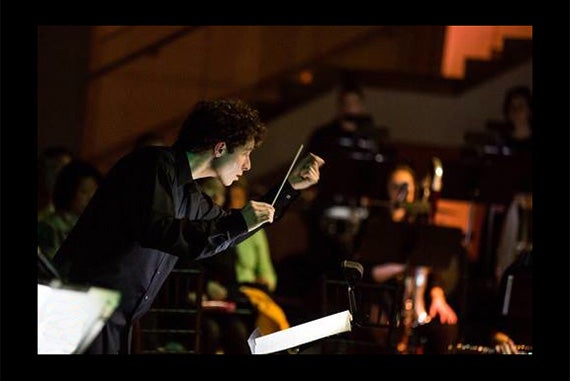
GAZETTE: Can you tell me how this project got started?
AUCOIN: It was the spring and summer of 2012. Diane [Paulus] and some other A.R.T. staff members saw my opera “Hart Crane” at the Loeb Mainstage and immediately asked about doing something together. Shortly thereafter Ryan McKittrick, their dramaturge, suggested I look again at Whitman’s diaries because they were planning a big Civil War-themed season. I did not initially find the Civil War an especially appealing subject for an opera because if you sort of imagine what a Civil War opera would look like, at least for me, I see lots of open fifths and Aaron Copland-ish stuff and a lot of bombast, and it’s just not me.
But Whitman is a figure that I have been fascinated by for a long time, and his personal journey, his decision to drop everything and volunteer in the hospitals for three or four years, and the mystery of that. What was he really doing beforehand? Was he in some sort of middle-life crisis? What were his motives? Was it pure generosity or was he also attracted to a lot of the rather helpless 18-year-olds by whom he was surrounded? It’s just a fascinating situation. And the hospital itself is a fascinating space. The hospital is kind of like Dante’s purgatory, it’s neither life nor death. The people there aren’t sure if they are going to return to this world or pass on to the next one. So it’s a desperately urgent place, everyone has a message they need to pass on. Whitman sees himself as the healer and the truth-teller and the listener and it just struck me as such a dynamic space to live in.
So that’s when the piece started taking shape, but I did a gigantic rewrite of it just last summer and fall.
GAZETTE: Why?
AUCOIN: The reasons were both musical and dramatic. Musically I think I discovered this kind of harmonic chain reaction or pressure point, a form of musical motion that I hadn’t discovered before. I discovered it at the very end of what I thought was the final version of the opera, in the final chorus. And as soon as I came upon it, I said to myself, “Well, this is the essential kernel of the opera. This is it. This is the stuff. I can’t leave it be as it is. I have to go back and use it as the kind of DNA of the whole piece.” So I rewrote most of the music.
And I also realized over the course of writing the libretto that a piece that I had originally thought was an ensemble piece, a kind of chorus of voices of the patients in the hospital, is really about Whitman and about this one fictionalized soldier with whom he ends up having a very intense relationship. And so there was a lot of cutting out the excess and ruthlessly, as it were, killing of characters that proved not to be essential. And so it’s a long, long road, but there isn’t any shortcut. The only way I could really discover the piece was by writing the wrong piece first.
GAZETTE: How long did it take you to get the first draft down? And how long did it take you to redo?
AUCOIN: The curious thing is that I worked on the first draft from about December 2012 until January 2014. So just over a year, and then let it sit for a couple of months. We did a workshop of it in April of last year, at which point I realized I really wanted to change it. So it’s really just between June and September that the piece as it stands was written. And that might sound like a short period, but it’s just the opening of the floodgates and the pressure behind the gates had been building for a long time.
GAZETTE: Can you tell me about the plot?
AUCOIN: The Civil War’s about to end, and we are in a hospital somewhere in the kind of limbo outside of D.C., near the border between north and south in a kind of wasteland, and Whitman gives a prologue in a very Dantesque way. He says: “I reached the middle of my life and realized I didn’t know who I was and I just had to do something radical. I had to enter another world to rediscover myself.” And I don’t think that’s such a stretch, actually, given that Whitman went through long periods of wandering, of not writing even, and then working in the hospitals. And then we enter the space and we meet the other protagonist, a soldier named John Wormley, who is actually a Confederate who has lied and claimed that he is a Union soldier in order to be treated at a Union hospital. He and Whitman are immediately interested in each other as the two sharpest people in this rather bleak space. They both have a sense of humor and neither of them quite believes the other’s story. Over the course of the piece Wormley betrays Whitman, forces him, unbeknownst to Whitman, to reveal some strategic information that would endanger everybody in the hospital. And after that happens, the relationship becomes or threatens to become a love relationship, but the betrayal’s already happened.
GAZETTE: In terms of writing the music versus the libretto, does one come before the other for you? Do you work on them simultaneously?
AUCOIN: The libretto always comes first for me.
GAZETTE: Why?
AUCOIN: If you think about how specifically the music in an opera depicts or reflects what’s happening on stage, practically if someone blinks or if someone’s facial expression changes, you want the music to be aware of it. It’s so specific that to write the music without the libretto strikes me as almost impossible because what are you working off of? What are you setting to music if there is no libretto? So I do try to bisect my brain and treat myself as a writer of words exclusively, and then once I’ve written the libretto to take off that hat and put the composer hat back on. Of course, along the way, musical ideas will occur to me and I am essentially scribbling marginalia as I write the libretto, musical marginalia, but they are two distinct processes. For me that’s a much cleaner way of working.
GAZETTE: Where do you do your composing? Is it just sitting down at the piano?
AUCOIN: Yes, it is, in my apartment. Basically I just lock myself in the cave and write. I do prefer to work with a piano because I think it keeps you honest, to have this big box, this mechanical thing to test your highfalutin’ ideas. I’ve got a studio … it’s almost like living in a tree house or a birdhouse. The walls are mostly glass and I am on the roof basically. So the light is wonderful, though it gets very cold in the winter.
GAZETTE: Did you study Whitman at Harvard? And in working on this piece, did you reach out to Helen Vendler or Jorie Graham or any other Harvard professor for advice?
AUCOIN: I spoke with Jorie early on. I didn’t take any Whitman-specific classes, but his poetry came up both in Jorie’s workshops and in a class I took taught by Steve Burt. He’s just one of those inescapable voices. I read him all throughout college. Read straight through “Leaves of Grass.” And he has a quality that reminds me of Beethoven, which is the line between what’s really great and what’s really terrible, just disastrously bad, is very thin. You almost can’t distinguish it. The same things that make “Crossing Brooklyn Ferry” a masterpiece are the kinds of gestures that make much of his other war poetry, for me, unreadable. It’s just like you’re stuck in a room with a crazy person and he’s shouting at you. In a similar way, when Beethoven pounds away at a tiny, single musical building block and just kind of pounds at the same door until either he breaks the door down or he is turned away. Whether he breaks it down or is turned away, he is doing the same thing. I think with a lot of other artists there’s a much subtler spectrum of good, mediocre, great, bad. But with Whitman and Beethoven, they take the biggest risks, and so they write some of both the best and worst stuff.
GAZETTE: Can you tell me about the title?
AUCOIN: It comes originally from “Crossing Brooklyn Ferry,” which is Whitman’s greatest revelation poem. In the process of crossing between Brooklyn and Manhattan on the ferry he becomes aware of a unity of human life across centuries and across geographical space, and somehow the motion of the water and the fragility but strength of the boat and the presence of other passengers and the view of these two shores and this passageway and the sky and everything, it just makes him aware that in the moment of crossing between these two places, in a way you sort of are any person that’s made that journey, that being part of these vast cycles of motion you can feel that you are part of something greater than yourself. It’s such a simple and such a profound realization. And then I realized that the word crossing has all kinds of resonances for my piece. John has crossed illegally into Union territory. There’s the transgression of the love affair, and there’s also the meaning of crossing as transcendence, crossing from one realm into another. Between the prologue and the first group scene, Whitman crosses out of his former life into this purgatorial space. And he finds that everyone who is in there is trying to cross out of it. So, I toyed with hundreds of titles and ended up choosing the simplest one. So that it seemed like crossing in all of those senses is what the piece is about.
GAZETTE: What’s it been like working with Diane Paulus?
AUCOIN: She is a force of nature. She has laser vision. If there’s something in a scene that won’t work theatrically, a moment that won’t read for the audience, she always, always sees it. And that’s the kind of thing that maybe one does not see if you’re the composer and if you have been living inside the cave of the piece and you have no perspective on it. She has been very helpful and very generous about that.
It’s really rare for a new piece to get the kind of tender loving care that Diane Paulus and Diane Borger and Diane Wondisford and Ryan McKittrick and the whole company have lavished on it. They’ve been willing to let the piece develop. They have offered great feedback that has informed every decision, including the decision to rewrite practically the whole thing, which was itself such a crazy thing to do. And I’m glad they had the faith to let me do that. It would have been perfectly reasonable for them to say, “It’s a little late for that.”
